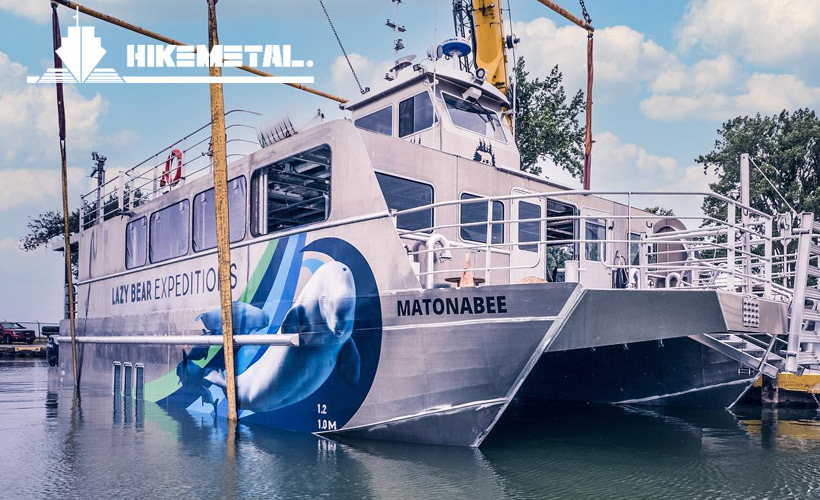If you try to build a boat without the right team, you will soon find yourself sinking before ever putting it into the water.
For more advanced types of vessels, one must also consider the electronic and navigational systems. When constructing that kind of boat, you need someone with a high level of experience in both advance Marine and Naval Engineering.
Luckily, our professional team at Hike Metal has handled a wide range of vessels from commercial fishing to Government projects. We have all the essential skills to make a ship and have experts in multiple engineering disciplines.
Read more to see what the engineering experts at Hike Metal, one of The Canadian Coast Guard’s preferred services, can do for you.
What Are Marine and Naval Engineering?
Marine and naval engineering are types of engineering that focus on boats. Naval engineering, also called naval architecture, is centered on the boat design process; marine engineering technology makes sure the boat has heating, refrigeration, electronic navigation, and propulsion systems are all above client standards.
Several colleges in North America offer degrees in marine engineering, naval architecture, or both in one academic program. In Canada alone, Scotia Community College, Naval Fleet School Atlantic, and several colleges in Vancouver, British Columbia, have these programs. If marine engineering courses are not available in your area, some places looking for naval/marine engineers will accept related degrees, such as mechanical engineering, electrical and computer engineering, nuclear engineering, and automotive engineering.
Demand for marine and naval engineers is very high in Canada. The Royal Canadian Navy offers courses through its marine engineer cadet training program; the Royal Canadian Mounted Police also employs marine engineers. Marine engineers are in high demand in Canada, and ours have a high level of experience fixing vessels owned by Transport Canada.
Are Naval Engineering/Architecture and Marine Engineering the Same?
They are similar, but no. The practical skills are different between the two disciplines. They nonetheless belong together like a pair of gloves, and some universities choose to combine them.
On the surface, these two fields look very similar. Both of them require a college diploma and are advanced academic studies. The distinction lies in the details. A naval architect makes the boat; marine engineers make it work. While one could ask a naval architect what systems are necessary on the boat they are making, they may not have the skills required for making those mechanical systems work. You would not put a left-handed glove on your right hand; unless your naval architect also had some marine engineering courses, they may not be specialized for that job.
Naval Architecture
Naval engineering, also called naval architecture, focuses on the outside and basic structure of the ship. This covers most physical aspects of ship design, including buoyancy, speed, weight, and ideal waterlines. They also need some creativity; architecture requires a steady hand and a lot of imagination as well as basic engineering knowledge.
Most impressively, however, a naval architect has to have excellent managerial skills and the ability to communicate with people both inside and outside the engineering sphere. According to Marine Insight, it’s a naval architect’s job to coordinate everybody working on a boat. They have to handle people who may not have basic engineering knowledge as well as people with degrees in electrical and computer engineering. Naval architects see a project through from the rough sketch to an actual ro-ro vessel. Our fishing vessels last as long as they do due to our naval architects’ managerial skills!
Marine Engineering
Marine engineering is a field of specialized study focusing on the electrical systems in a ship. As the Institute of Marine Science and Technology outlines, these systems include propulsion, refrigeration, BWR vessel safety, and steering. The program requirements will vary depending on where someone goes, but there will be a focus on marine systems. Most marine engineers will go through some form of training for navigation via simulated electronic navigation.
Marine engineering technology is changing very quickly. Along with the electrical systems on ships, marine engineering technology includes submarines, deep-sea robots, and offshore platforms. If you think the sea’s the limit, it’s a worthy college diploma.
Do You Need Both?
Ideally, yes. The marine engineer will know what propulsion systems to use in fishing vessels, but without a naval architect’s engineering management skills, the wiring might not be implemented properly. We employ both naval architects and marine engineers to create some of the best fishing vessels in North America.
Conclusion
Many factors go into making a boat, including some things you do not think about until someone asks. Different types of vessels have different requirements. We might have started with fishing vessels, but can make many types of vessels, including some used by the coast guard. We know how important it is to have both naval architects and marine engineers when designing many types of boats.

Between our relationship with Transport Canada and decades of experience with many types of vessels, we have a solid foundation of experience and talent. Hike Metal has the practical skills, level of experience, and knowledge to make your boat the best it can be inside and out. Contact us today to ask about our shipbuilding services.

